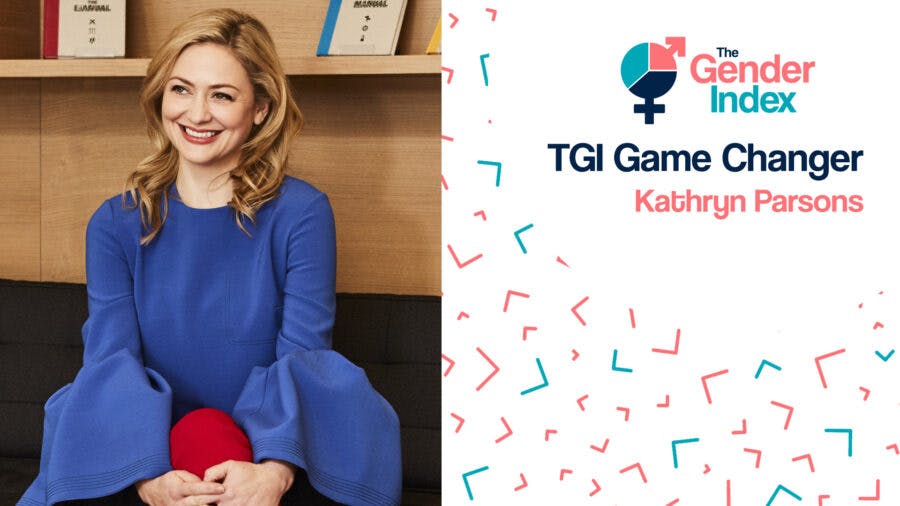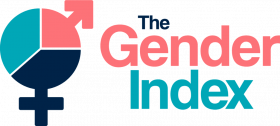We use cookies to effortlessly improve your experience on our site. Cookies also help us understand how our site is being used, so that we can keep making it better. You can read more about it in our cookie policy and change your settings here at any time.
“It’s giving someone the opportunity to reimagine what they’re capable of and feel alive again”

Kathryn Parsons is the co-founder of ed-tech business Decoded and joins The Gender Index’s line up of inspiring thought leaders – @TGIgamechangers.
She tells us about her journey as a co-founder and what she loves about being at the forefront of technology education, including changing people’s lives and helping them expand their careers.
Connected to her passion, Kathryn is an inspiring company founder and business leader.
Can you tell us a bit about Decoded and what you do?
Decoded is a technology education company founded in 2011 in London. Our mission was to demystify the digital world, and remove the jargon, fear and complexity surrounding technology.
These are the skills of the future, and we wanted to make these accessible, so that people can be conversant in technologies that are impacting our lives, our businesses, the economy and the world we live in.
We now work with companies, businesses and governments all across the world, with their boards and leadership teams down to their apprentices and graduate recruits, and everyone in between. This can be anything from an immersion in artificial intelligence for the board of a telecommunications company to boot camps in data analytics for a media company. We’re even teaching the US Senate and Houses of Congress.
How and why were you inspired to start Decoded?
I wanted to learn how to code because I’d been doing a lot of work in the digital space. I just love technology, it is my thing. I’d studied languages (Latin, ancient Greek, Japanese and Mandarin) and I couldn’t believe that I didn’t understand the language of technology. If it’s complex, I want to understand it. I Google searched coding schools, and even asked a coder I knew to teach me. Everywhere I went was a no. Even computer science courses didn’t teach coding as part of the curriculum.
So I was self-taught, but realised there was a huge gap to be filled. A year later we (me and my co-founder Richard) hosted our first workshop for 10 people. It was incredible. I can still remember who sat round that table, a real mix of people, from the head of policy for a big tech firm to a 17 year old looking to start their own business. Decoded grew from there.
What have been the highlights?
For me, it’s those case studies of transformation. That really excites me. I love hearing when somebody has overcome their lack of belief in their ability to learn a new skill. And they emerge on the other side, whether it’s from an 18-month long apprenticeship levity-funded program or a one-day course. They come out of that with a transformed mindset and/or transformed skill set.
We had a person who worked in insurance, who had never done any more than use the phone and send emails. He wanted to attend one of our data boot camps but had been told he wasn’t technical enough. Eventually he managed to get on and his passion for upskilling was incredible. He was extremely successful and graduated with flying colours; moving roles to report into the head of data science. He told us we’d given him another 10 years on his career that he didn’t think he had. For me that’s incredible, it’s giving someone the opportunity to reimagine what they’re capable of and feel alive again.
What have been the challenges?
The challenges are probably for everyone out there who’s founded a business and solidarity to you all. Every step is just another hurdle to overcome. From making that first hire, to the first fire. How you fund, launch and expand new products. Taking a product to market and getting the price right. Delivering products that your customers love. Ensuring that you are leveraging your own data. There are very few people who found it a wonderful growth journey. You have to have a very adaptable mindset. And always maintain very strong relationships with your co-founders, boards and mentors.
As an expert in data, how do you think data can support the growth of female entrepreneurship?
I sit on the board of The Alison Rose Review into female entrepreneurship. And what I like about the Investing In Women Code, which they are encouraging every VC and bank to sign up to, is that it asks for data on the diversity across each investment portfolio. Because without that you can’t measure and make an impact. Once we have data, we can understand the problem, rather than making assumptions. And it enables problem solving in a more strategic and meaningful way.
Another example is an organisation called 25 by 25, where I also sit on the board. They’re looking at how to increase the number of female CEOs across the FTSE index. And their approach is very data-led, looking at the data behind succession planning in businesses and the processes put in place to enable people to go from senior leadership roles into the C-suite. And specifically how women can be more successful in that process.
Specifically how can TGI support here?
It’s offering transparency through data, which can be used to create new initiatives and drive a new direction. One that involves being more focused and strategic.
What is the one piece of advice you would give female founders?
I’ve been very heartened by the incredible communities that I’ve seen crop up around female entrepreneurship over the last five years. The Gender Index is one. And it’s data-driven, making it even more powerful. These networks are driving change and mean that founders don’t have to be alone. I advise founders to lean into these networks. Don’t go at it alone. It’s a tough journey but so rewarding. And so much better if you discover and engage with other women on that journey.
(Image credit: Josh Shinner)

